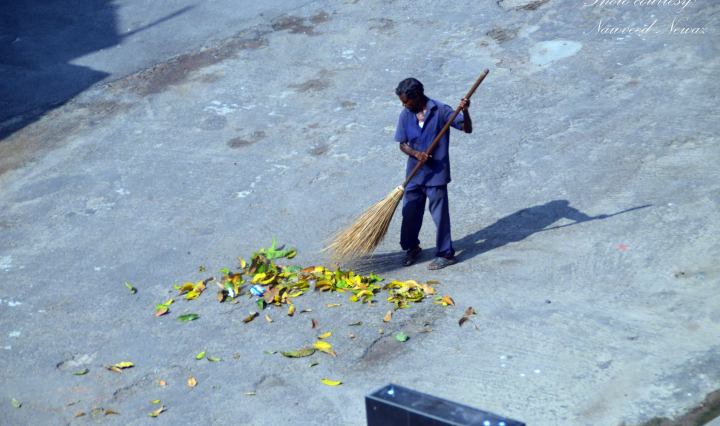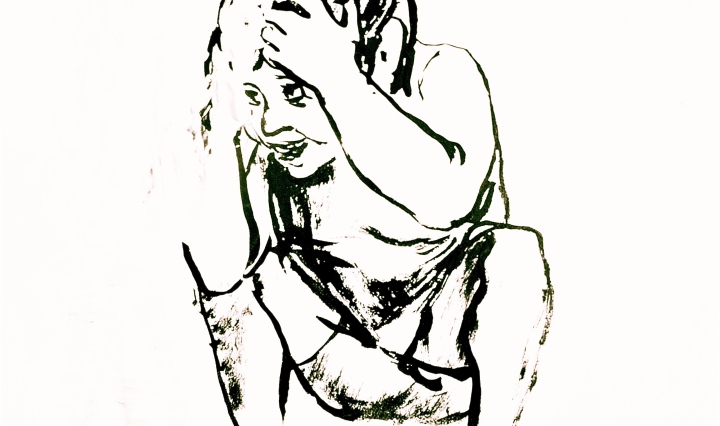 Sticky post
Sticky post
Not merely for the west
Speaking, writing, expressing in English rather than the mother tongue could be misunderstood as a way of the privileged showing off Continue reading Not merely for the west
 Sticky post
Sticky post
Speaking, writing, expressing in English rather than the mother tongue could be misunderstood as a way of the privileged showing off Continue reading Not merely for the west

Kazi JesinI wanted to tell youI too have a dreama soft pillowa open windowa glaring paddy fieldpalm trees swinging in the windbut I had no words.You gave me blue polythene —a forbidden house on the footpath. Under the blue lightsmy … Continue reading Words are not more valuable than bread

Syed Jamil Ahmed’s first play in two decades, RIZWAN, opened on September 01 at Shilpakala Academy (closes Sep 10). The play, based on an English poem about Kashmir, is experimental, raucous, jubilant, and always challenging the material limits of a stage. The audiences have responded with hunger, Shilpakala has been running sold out shows. Responses have ranged from enthusiasm by those already used to experimental fare from Prachyanat, Bot Tola, and others, to the nervous responses of an old guard still not able to embrace radical theater for a new Bengal.

Agha Shahid Ali (Source: Academy of American Poets)
Debates about RIZWAN range widely, but few audience members have been curious about the source material- Agha Shahid Ali’s poem on Kashmir, THE COUNTRY WITHOUT A POST OFFICE. Ali’s 1997 poem is a landmark of Indian-American/Indian diaspora poetry. Considering the popularity of the play, paired with the experimental opacity of the on-stage dialogue, we present here the original poem, preceded by a sparkling new translation done by Azfar Hussain.
Continue reading “Agha Shahid Ali by Azfar Hussain”

by Faruk Wasif
In the name of non-standardising, a luminous (yet stupid) collective wishes to drag Bengali down to a demotic vernacular. However, to remove inherent, traditionalist inflexibility within the language, all dialects – from Tagore to Abbasuddin, from Calcutta to Sylhet – should be used profusely; so that, the real (or main) parts of the language (and its literature) can include tongues of all Bengalis. Continue reading “Neo-Bangladeshi Collective”


[Please note that the review might reveal more than you want to know before reading the book. I would say skip it and read the book.]
Anyone interested in Bengal’s premodern to modern history – through the Delhi and Bengal Sultanates, and the Mughal rule in India, and consequently in Bengal – and more importantly the rise and spread of Islam in Bengal will have to go through this thoroughly illuminating seminal work from Eaton.

When you turn to page 186 of In the Light of What We Know, you encounter an illustration. The novel’s two main characters have by this point discussed many things, and readers may have already been craving visual aids. But this is the first time the text is interrupted by a diagram. You sense, therefore, the arrival of a crucial digression. Continue reading “Known Unknowns of the Class War”

What is harder to explain, however, are the actions of us independent Bangladeshis. The fact that we allowed him to return to the country he conspired against. The fact that he was allowed to stay here for 16 years – from 1978 to 1994 – on the passport of a foreign country and practice politics, when he did not even have a valid visa.
Continue reading “Mufazzal Haider Chaudhury’s Son Speaks: The Unrepentant Man”

“A country whose soil is soaked in the blood of the martyrs, a country whose soil still bears witness to the history of genocide — the soil of that country will receive the body of the Captain of the Rajakars? How are we to answer to our conscience?”

But with all its manifold new words from other tongues, English could never have become anything but English. And as such it has sent out to the world, among many other things, some of the best books the world has ever known. Continue reading “Ahmed Shamim: Colonisation Of Bengali Language and Tagore – Open vs Rigid discourse”

by Lamia Karim for alalodulal.org
A mathematician by training, Zia Haider Rahman’s debut novel is a literary masterpiece. It is a deeply unsettling novel where the protagonist’s ‘descent of hope’ reveals our loss of a shared humanity. The novel is a magisterial sweep of the landscape of the 21st century that is characterized by war, migration, and rootlessness.
Continue reading “In the Light of What We Know: A Novel that Defines Our Times”

আর একটু হাঁটো কবি
পথ চলা এখানে থামালে যে চলবে না,
আমার তো এখনও অনেক শেখার বাকি।
Continue reading “তোমার যাওয়া হবে না কবি/You Can’t Yet Leave, My Poet”

লাতিন ও বাংলা উপন্যাস: আত্মের হদিস কিংবা উপন্যাসে আদমসুরতের নকশা
ফারুক ওয়াসিফ
যে জগতের গিঁট ছিঁড়ে গেছে, যার মন থেকে মুছে গেছে দুর্ধর্ষ সব কল্পনা, যে হারিয়ে ফেলেছে স্বপ্নজননক্ষমতা, সেই জগতে মার্কেসের মতো কথাকারেরা ফিরিয়ে আনলেন পুরাণপ্রতি কল্পনা৷ Continue reading “Remembering Garcia Marquez: Latin & Bengali novel, finding the self, or the map of the human apparition”

By Ikhtisad Ahmed for AlalODulal
History exists in the abstract. Vague theories are posited, established and refuted, but rarely felt. Over the years mankind has perfected this art-form into an exact science. Regrettably, Bangladesh never got the instruction manual. Continue reading “Ekusher Prothom Kobita”

My Cartographer by Awrup Sanyal for Alalodulal
This city now wears a different look, walks a different gait, hides and reveals differently, calls out from nooks I never knew existed. Continue reading “My Cartographer”

Nazrul’s Poetics: a polyphonic discourse of the multitude
Haider A. Khan for Alalodulal.org
Nazrul burst forth on Bengal’s literary scene at the end of the First World War, like a Nietszchean ‘dancing star’.[1] Continue reading “Haider A. Khan: Nazrul’s Poetics”

“Taslima’s misery somehow leads us to the crossroad where an imminent change of path is indispensable. The consolidation of secular liberal voices in the subcontinent who would vociferate not against the chauvinism of religious majority of a nation but against all the extreme elements of any religion across the border and battle for the absolute separation of ‘church and state’ is the demand of the hour. Are we up for it?”
Continue reading “Taslima Nasreen, ‘Duhsahobas,’ and a TV cancellation”

Juxtaposed Realities: Dhaka
A short story by Mehreen Ahmed
On a chilled grey dawn, I hear a call out. I get out of bed fumbling, and reach for my shawl. Continue reading “Mehreen Ahmed: Juxtaposed Realities: Dhaka”

by Ikhtisad for AlaloDulal.org
***
Nazrul died today, newspaper says,
Spelt his name wrong, common mistake:
Unimportant, not an op-ed or commentary,
What does it matter anyway?
Father is well and mother survives,
My abode keeps me warm –
Veritable ivory tower, for far away
It is from the damned land.
Continue reading “Thine Kingdom Is Mine”

By Ikhtisad Ahmed for AlalODulal.org
Joya was far from comfortable. The metallic desk-chair had gaping holes in its plastic upholstery. The sharp edges of these gaps protruded outwards and mischievously jabbed the unfortunate occupier. She had positioned herself on the brink, which had no tears, but the rusty metal frame pressed against her thigh coldly. The cup of tea that rattled against the matching saucer in her shaking hands had long gone cold. The drying bag of PG Tips poised delicately on the lip of the plate muffled the sound in parts.

Memories of her father
Lisa had always envisioned Bengal as a land of unsurpassable warmth and beauty. Now that she was here, she thought of all those moments when her mind had done a scene-by-scene play of how she would feel when her flight touched down in Dhaka. Would her first aerial view be of trees lining the airport road, or water bodies caressing the city’s eastern borders? Would the aircraft make a rough landing during a pre-monsoon boishakhi thunderstorm or smooth sail on a crisp, sunny, winter day? Perhaps she would arrive during the monsoons, so that the rain could rejuvenate the tree-lined streets by her grandparents’ house, to their greenest, in anticipation of her arrival.

By Awrup Sanyal for AlalODulal.org
Jaron and Ashanti walked towards the large wood and glass door at the top of the stairs. Squeezed in by the swell of the crowd from the hall they moved in step. All the while Jaron video-taped the crowd on his smartphone. The music was pumping, the chatter deafening, the party still waltzed on its drunken legs.

My father would have been 87
by Tanvir Haider Chaudhury
It was my father’s birthday yesterday. Professor Mufazzal Haider Chaudhury would have been 87. He never got to approach that age because he was tortured and murdered at 45, the same age as I am now, by the Al-Badr militia. In 1971. Continue reading “My father would have been 87”

Humayun Ahmed: Personal Reflections on the Anniversary
Shafiqur Rahman
In the week following the tragic death of Princess Diana of Britain in 1997, the reputedly “stiff upper-lip” British showed emotional outpouring on a mass scale such as the world has never seen before. The aftermath of Diana’s death is now recognized as a watershed moment in modernity. Continue reading “Humayun Ahmed: Personal Reflections on the Anniversary”

On the first anniversary of Humayun Ahmed’s death, ALAL O DULAL is publishing a translation of one of his earliest interviews– published in 1974 Bichitra, independence day issue. Continue reading “Humayun Ahmed: The 1974 Interview”

by Sayeed Jubary, translated by Khujeci Tomai for AlalODulal.org
1.
In the Bengal of Do-As-You-Please
In Mohammed’s Bengal
No space for Rajakars
In Karl Marx’s Bengal
No space for Rajakars
In Mao Tse Tung’s Bengal
No space for Rajakars
In Gandhi’s Bengal
No space for Rajakars Continue reading “Sayeed Jubary: Post-Revolution Poems, Part 2”

Rabindranath Tagore’s Assassination of Female Characters in ‘Chaturanga’
by Andaleeb Shahjahan Purba, for AlalODulal.org

1.
Prayer
What chases me is not death, but fear of death
Hiding inside its own nature
My assassin floats about
I avoid suicide and make one last prayer
Let me not die as a bystander… Continue reading “Sayeed Jubary: Post Revolution Poems, Part 1”

The Skin I’m In: Afro-Bengali Solidarity & Lost Histories of America
Naeem Mohaiemen reviews Vivek Bald’s “Bengali Harlem”

Cross-posted from Caravan]
Know Thy Neighbour: On the Bangladeshi literary giant Humayun Ahmed
By Aruni Kashyap

MY GRANDMOTHER’S HOUSE in Teteliguri—a village about 50 kilometres east of Guwahati, northeast India’s largest city—was a chaotic place, home, when I was growing up, to more than 20 relatives. It was there that I spent most of my school vacations, there, in that L-shaped house—where at least three women were required to lift the huge cauldron of rice off the hearth—that I began to read. Continue reading “Know Thy Neighbour: Aruni Kashyap on Humayun Ahmed”

Young poet Mahmud Hasan died yesterday. He was a Philosophy student at Dhaka University. At his funeral, his parents made one request of his friends: please collect all his writings and publish them, so his memory can be honored. We are publishing Mahmud’s last poem, written two days before his tragic death. Translated by Naseef Amin.

The Hay Festival controversy picks up speed as protesters demand “Prime Minister’s intervention to refrain Bangla Academy from being the host of the Hay Festival on the academy premises, resignation of Bangla Academy director general Shamuzzaman Khan and bringing charges of anti-state activities.”
The following chronology is compiled from various blog and facebook posts.
1. Somewherein blog by Tokon Thakur on who are the corporate sponsors of Hay, why this English matbori, anointment of elites. He singles out “Kaziputro” (son of Kazi, a reference to author K. Anis Ahmed) and “Anamkonya” (daughter of Anam, a reference to Tahmima Anam). Kazi & Kazi Tea and Daily Star are two of the sponsors of Hay. K. Anis released Goodnight Mr Kissinger, right before Hay, and Tahmima Anam released The Good Muslim earlier this year.

These days our national discourse — the facebook broadcasts, the print media junks — have made villain out of Shaon, the just widowed wife of deceased writer Humayun Ahmed.
Wife Shaon and publisher Mazhar are the villains in all Bangladeshi tabloids now a days. But these are the two people who were with Humayun during his last lap. Shaon’s struggle to save Humayun was en epic battle. Can anyone imagine how difficult it was for her to move to NY with two very young kids and a sick man who, all his life, is used to have everything done for him, including bringing a glass of water? Shaon had to start a family from scratch. Singlehandedly. Mazhar and some occasional local Bangladeshi vagabonds helped her out once a while.

Contrarian Thoughts on Humayun Ahmed
– by Bookworm Blogger
So Humayun Ahmed finally died a few days ago. Not unexpected really, considering his advanced age and his prolonged battle with cancer. You don’t really win fights like those in the end. He didn’t either.
I got the news as I was sitting in the bus, going to the mall. Facebook feeds on the mobile, of course, what else. All in all – and it’s now been several days, so my reactions have had time to settle – I find myself almost entirely unmoved by this event. Except perhaps for a brief moment of heaviness just after I heard the news. After all, this IS Humayun Ahmed. THE name to contend with in modern Bangladeshi fiction.
Sure, he was a very talented writer. Yet my enduring memories of reading Humayun are few and far between. In total, I can’t say that I read more than 12-15 of his books – and the last one was a good 20 years ago. Perhaps because towards the end – and for me, that would be 1992-93 – the crap content was so high that I felt there were far better uses of my time than reading the ramblings of some loser kid in a yellow punjabi or whatever the latest fad was that the Humayun word-machine was churning out to keep greedy publishers and childish readers happy. Continue reading “Contrarian Thoughts on Humayun Ahmed”


I guess Humayn Ahmed’s upcoming novel “deyal” is going to win the distinction of second most talked about ‘book-in-writing’. ( I give it second place because for hype about a ‘not-yet-written’ novel, the top place all time in the history Bangla literature will unsurpassably remain with Tahmima Anam and her novel ‘A Golden Age’, ever). Dozen of articles and op-eds have already been published in several Bangladeshi outlets ( but nothing compared to New York Times, Guadian, NPR reviews and dozens of TV interviews of Tahmima Anam gave including BBC radio even before her first ever novel was published). Even this obscure blogger tried to write an amateurish piece in BDNews 24.com opinion page. The full piece is reproduced for AlalODulal readers across the fold.
But on the side of the fold let’s share with you one reader’s comment about the piece. The reader commented,
Humayun Ahmed has received so much help, financial assistance, and favors from the current government that he probably feels obligated to pay off some his debt, which is fine except he shouldn’t try to call his novel a piece of literature. He should, if he is honest, put the testimonial at the beginning of his novel that it is his way of paying off his debt to this government.
As the reader rightfully questions the literature value of this upcoming novel and our court and the government remains very concerned about the historical value, this blogger sees the novel as the litmus test for intellectual honesty of author-film maker Humayun Ahmed.
Complete piece is over the fold.